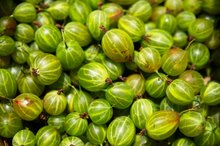Does Ginkgo Go Bad?
Ginkgo (ginkgo biloba) is primarily used to increase memory function and help people overcome headaches, dizziness, mood disorders, blood circulation and other medical problems. Studies indicate ginkgo biloba vitamins and medicinal products increase blood flow to the brain, and the National Institutes of Health says the tree leaf extract is used to treat -- but not prevent -- memory loss in Alzheimer’s disease and dementia patients 2. Ginkgo supplements are made from herbs that lose potency as they age; manufacturers recommend discarding the products if they are more than three years past the production date.
Ginkgo Trees
The ginkgo is the national tree of China and is among the world’s oldest species. Mature ginkgo trees are large -- they can grow up to 165 feet tall in some climates -- with branches that sprout groups of leaves. ; March, 2009'). Ginkgo leaves also produce terpenoids that dilate blood vessels to improve platelets and blood flow. Other names for ginkgo include Maidenhair Tree, Fossil Tree and yinhsing.
- The ginkgo is the national tree of China and is among the world’s oldest species.
Uses
How to Take Ginkgo With Vitamins
Learn More
Over-the-counter ginkgo herbal supplements, such as tablets, capsules, skin patches and teas, are used to treat a variety of illnesses, ailments and afflictions that include:
- memory function
- fatigue
- bronchitis
- ringing of the ears
- mood swings
- difficulties in concentration
Products are available without a prescription and should be used within the shelf-life dates printed on the packaging. Contact the manufacturer if an expiration date is not on the package. The United States Food and Drug Administration does not evaluate product usage or marketing claims of over-the-counter supplement manufacturers. The FDA will, however, investigate consumer complaints.
- Over-the-counter ginkgo herbal supplements, such as tablets, capsules, skin patches and teas, are used to treat a variety of illnesses, ailments and afflictions that include: * memory function
* fatigue
* bronchitis
* ringing of the ears
* mood swings
* difficulties in concentration Products are available without a prescription and should be used within the shelf-life dates printed on the packaging.
Possible Effectiveness
Although scientific opinions vary, studies cited by the NIH, United States Department of Agriculture and the Mayo Clinic say ginkgo supplements have helped Alzheimer and dementia patients with memory loss and elderly participants with concentration and mental processing. The NIH says Premenstrual Syndrome, vertigo, poor blood circulation and vision-affected conditions may also be improved with ginkgo supplements.
Side Effects and Warnings
Magnolia Flower Health Uses
Learn More
The NIH says ginkgo supplements may produce side effects like diarrhea, upset stomach and nausea, restlessness and skin problems (acne or rashes). Ingestible ginkgo products should only be made from the tree’s leaves. Although the seeds -- with the pulp removed -- are a delicacy in Japan and China, you should never eat whole raw or roasted ginkgo seeds because they contain toxins that may cause seizures or death. Check with your health care provider to determine compatibility with other medicines and vitamins before taking ginkgo products.
- The NIH says ginkgo supplements may produce side effects like diarrhea, upset stomach and nausea, restlessness and skin problems (acne or rashes).
- Although the seeds -- with the pulp removed -- are a delicacy in Japan and China, you should never eat whole raw or roasted ginkgo seeds because they contain toxins that may cause seizures or death.
Related Articles
References
- University of Maryland Medical Center; Ginkgo Biloba; S. Ehrlich, et al.; March, 2009
- National Institutes of Health; Complementary and Alternative Medicine; Ginkgo
- Van Beek, T. A. (2002). Chemical analysis of Ginkgo biloba leaves and extracts. Journal of Chromatography A, 967(1), 21-55.
- DeKosky, S. T., Williamson, J. D., Fitzpatrick, A. L., Kronmal, R. A., Ives, D. G., Saxton, J. A., ... & Kuller, L. H. (2008). Ginkgo biloba for prevention of dementia: a randomized controlled trial. Jama, 300(19), 2253-2262.
- Snitz, B. E., Oâmeara, E. S., Carlson, M. C., Arnold, A. M., Ives, D. G., Rapp, S. R., ... & DeKosky, S. T. (2009). Ginkgo biloba for preventing cognitive decline in older adults: a randomized trial. Jama, 302(24), 2663-2670.
- Rigney, U., Kimber, S., & Hindmarch, I. (1999). The effects of acute doses of standardized Ginkgo biloba extract on memory and psychomotor performance in volunteers. Phytotherapy research, 13(5), 408-415.
- Kennedy, D. O., Scholey, A. B., & Wesnes, K. A. (2002). Modulation of cognition and mood following administration of single doses of Ginkgo biloba, ginseng, and a ginkgo/ginseng combination to healthy young adults. Physiology & Behavior, 75(5), 739-751.
- Tamborini, A., & Taurelle, R. (1993). Value of standardized Ginkgo biloba extract (EGb 761) in the management of congestive symptoms of premenstrual syndrome. Revue Francaise de Gynecologie et D'obstetrique, 88(7-9), 447-457.
- Ozgoli, G., Selselei, E.A., Mojab, F., Majd, H.A., A Randomized, Placebo-Controlled Trial of Ginkgo biloba L. in Treatment of Premenstrual Syndrome. The Journal of Alternative and Complimentary Medicine, 2009. 15(8).
- Wu, Y., Li, S., Cui, W., Zu, X., Du, J., & Wang, F. (2008). Ginkgo biloba extract improves coronary blood flow in healthy elderly adults: role of endothelium-dependent vasodilation. Phytomedicine, 15(3), 164-169.
Resources
Writer Bio
Teri Silver began a career in 1984 as a news, sports and feature writer/reporter, anchor, editor, producer and program host for central Ohio radio and television stations. She has done work for stations including WTVN, WMNI and WOSU (NPR). Silver has a Bachelor of Arts in journalism with an English minor from The Ohio State University.









